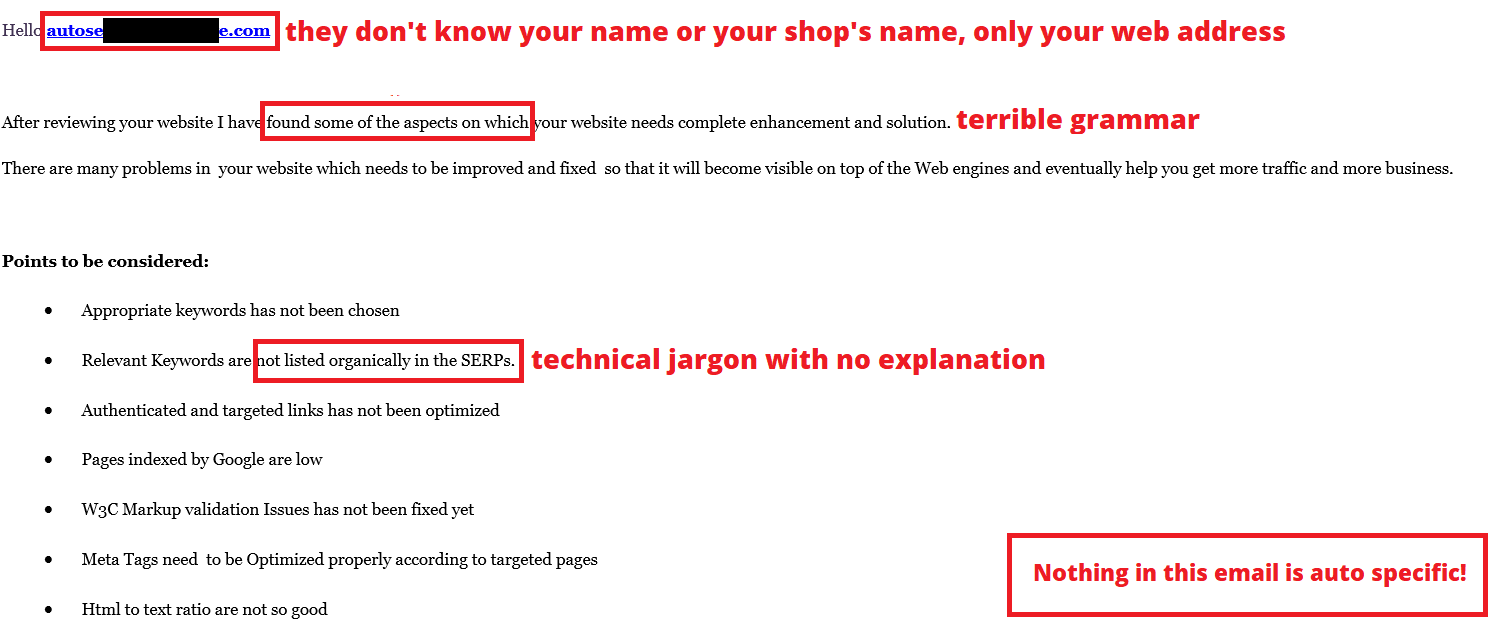We’re the best choice for managing your online web presence if you’re an independent repair shop (okay, we’re a little biased :)). We aren’t the only company who can help, however – there are other companies with the auto repair marketing knowledge to do a good job of representing you online.
Unfortunately, there are plenty of companies who don’t have that knowledge. And they blow up your phone or email every day. Some of them are just selling overpriced websites; they can’t write automotive content and know nothing about how to make auto repair shops search well.
Unfortunately, most of them are even worse than that.
Our customers frequently send us emails they’ve received about their website underperforming and ask, “are these legitimate problems?” Most of these emails fall into the “scam” category. Here’s how to spot a scam.
Red Flags that a scammer is emailing you.
Scammers operate by sending out millions of emails to any email address they can find, hoping to catch a business owner desperate for more business. In order to work, every word in the email has to be relevant to anyone, in any state, in any industry. That means that the email is extremely vague. Here are some signs you can just toss the email directly into the trash.
- They have no idea who you are. The email refers to you by your website, not your name.
- Nothing in the email is specific to auto repair, or to any content on your website.
- They intentionally use technical jargon they know you won’t understand.
- You have no way of verifying that any of what they’re saying is true.
- The grammar is awful (this email probably wasn’t written in the US)
Here’s an example of a scammer email. Click the image below to make it larger.
Red Flags that a hacker is trying to trick you and hijack your computer.
Cyberfraud emails try to trick you into giving a hacker access to your data or your financial information. They might reference some website problem or other technical support issue, but they probably aren’t trying to get you to call them. Cyberfraud emails look very similar to a scammer email, with a few additional red flags.
- They may try to trick you into thinking they’re someone they aren’t such as a delivery company, bank, or other major company you’ve heard of before.
- They tell you that the email is urgent, and you need to do something quickly.
- They want you to click a link – and the link doesn’t go where the email says it goes.
- They include an attachment and tell you that important information is in the attachment.
Avoid clicking on anything in these emails! Delete them immediately. Many of these emails try to lock you out of your PC and encrypt your data. They will then try to extort you for hundreds (or thousands) of dollars to get it back.
Here’s an example of a cyberfraud email. Click the image below to make it larger.
To learn how Repair Shop Websites can help you earn more business, call us at 855-294-6397 or email us at Team_RSW@RepairShopWebsites.com.

